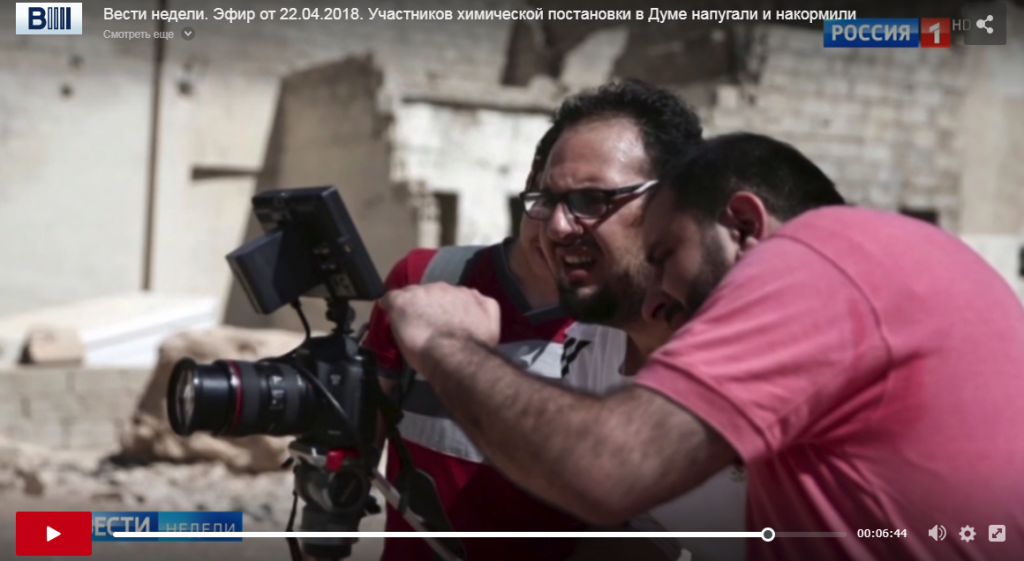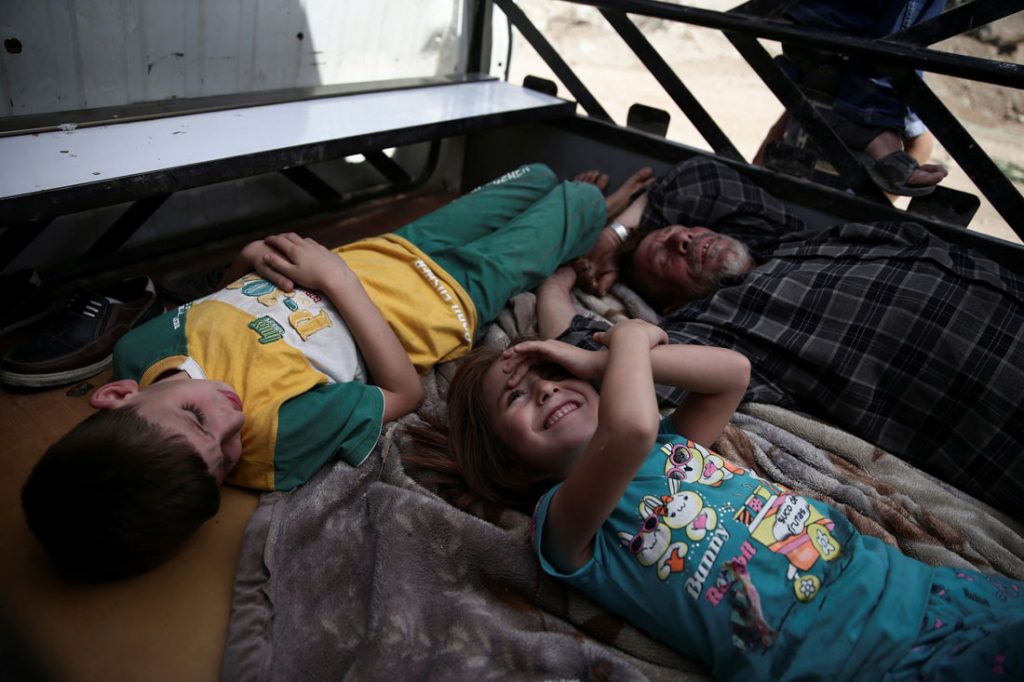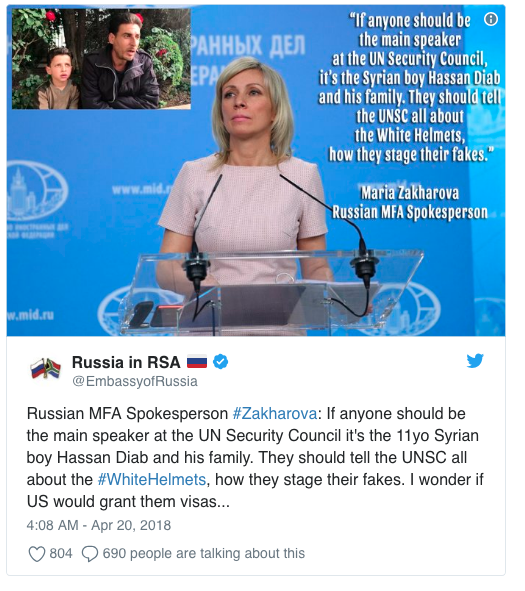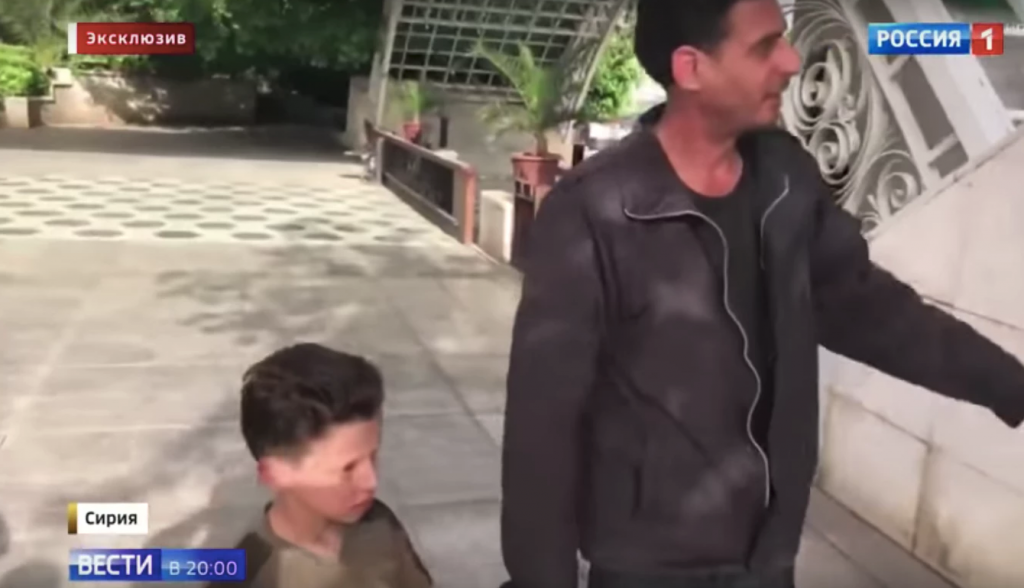
The screenshot of the April 22 program of Russian State TV that asserted the West’s media faked the April 7th chemical attack in Syria.
After a likely chemical attack on April 7 in the Syrian city of Douma that served as a reason for the later U. S. targeted attacks on Syrian military targets, Russian television produced a number of stories stating that the videos depicting the attacks were fakes staged by anti-Bashar Assad activists.
On April 22, Russian state TV “Russia 1” broadcast footage presented as “proof” that there was no chemical attack in Douma. Footage demonstrated how filmmakers had shot a staged chemical attack. The footage was later shown by almost all Russian National TV channels, making a national sensation out of this “discovery of the proof”.
It didn’t take long for Russian Internet to make a real discovery: the footage used by Russian TV channels supposedly covering the photography was actually from the short fiction film Humam Husari made in 2016. A Syrian born British filmmaker had shot a short film about the chemical attack of Bashar Assad’s troops using sarin in East Gut in 2013. The director staged with actors the consequences of those events.
Russian Internet even found a Chinese publication of 2016 (http://www.globaltimes.cn/galleries/384.html) covering Husari’s filming:
“Highlights: Humam Husari, a 30-year-old Syrian-born filmmaker, is hoping to harness the medium of film to attract the world’s attention to the real-life stories of the victims of the 2013 sarin gas attack. Husari’s film follows a rebel fighter who lost his wife and child in the chemical attack near Damascus, the capital of Syria. He has no time to bury his fallen family members, and is forced to take up arms to defend against an attack from government forces. “We need to know how people here were forced to join and become a part of the war,” said the young filmmaker. These pictures offer a behind-the-scenes look at what it takes to bring these real-life stories to the big screen. Photos: CFP

“Two children play on the back of a truck while a man takes a nap, during a break in filming in the suburbs of Damascus, Syria, on September 19.”
The Russian TV reports claiming the attacks aftermath were faked, also included an interview with a boy, identified as Hassan Diab, who was described as a crucial witness because he was first seen being doused with water after the chemical chlorine gas attack in Douma on the night of April 7. This video was allegedly shot by an opposition activist.
In the interview, allegedly recorded by Russians in Douma, the boy claimed that there was no gas attack. The boy’s interview was considered so important by Russian officials that Vassily Nebenzia, Russia’s ambassador to the United Nations, planned to screen it for the Security Council.
Here is a screenshot from official twitter-account of the Embassy of Russia in South Africa:
At the start of the Russian television report, which included the interview with the boy, the boy and his father are seen walking outside a building with a distinctive tiled floor and arched entryway.
Several people familiar with the city of Damascus independently suggested on Twitter that the shot wasn’t taken in Douma. They said the location appeared to be the Syrian Arab Army’s Officers Club in Damascus. That was finally confirmed by a photograph of that building’s exterior found on the Syrian defense ministry’s website.
According to the sociological survey conducted by the All-Russian Center for the Study of Public Opinion (VCIOM) and published on the organization’s website, most Russians (52%) receive information about events in the country and the world from television programs. According to the survey, 70% of respondents trust the information of central television channels.
Internet is used for getting news by only 32% of the inhabitants of Russia.
The rating of the freedom of press for 2018, which was presented by the international non-governmental organization “Reporters Without Borders”, stated that the freedom of the media in Russia has degenerated to the level of 30 years ago. Russia remained on the 148th place in the rating.
Reporters Without Borders noted that five Russian journalists and bloggers are in detention (the largest number since the collapse of the USSR), and the pressure on investigative journalists and control over the Internet is intensifying.
In addition, Russia is expanding its propaganda abroad through its RT and Sputnik networks.



